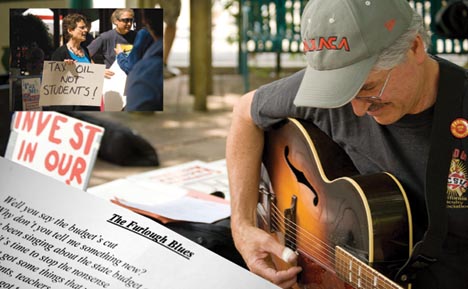CFA, students protest

Photos by Carli Knickerbocker and Graphic by Adalto Nascimento
September 10, 2009
The California Faculty Association (CFA), along with many students, filled the Sacramento State quad with protests against increased student fees and furlough days.
In addition, protests were held Monday and Tuesday morning last week in hope of raising public awareness about the fee increases.
The 32 percent fee increase voted on by the California State University Board of Trustees, along with a 10 percent cut in employees’ pay due to furloughs, and less time for students in class for more money are the reasons why CFA and Sac State students decided to protest.
“We need public attention to let people understand the damages being done to the institution and how this is going to affect the entire state,” said Winston Lancaster, professor of biological science.
“We are here to tell them to chop from the top and stop balancing the budget on the backs of the faculty, students and staff,” said CFA President Kevin Wehr, professor of sociology.
Administrators including Chancellor Charles B. Reed are also taking furloughs.
Alma Lopez, senior biology major said she has to work three jobs in order to pay for her tuition this semester. Lopez also has to take additional semesters before she graduates because of conflicts in her work schedule and the university’s cap on units.
“Two semesters ago I was paying $389 per month to go to school here and now I’m paying more than $500,” said Corin Ramos, senior psychology major. “My mom wanted to come this semester to start on her degree; she can’t because we can afford only one of us to come to college.”
This semester, state university fees have been increased by $336 per semester for full-time undergraduate students and $414 for graduates. The total cost for students this fall fee is now $2,013 for full-time undergraduates.
The university and CSU system has been working however to increase financial aid for those already receiving it.
Students are not the only ones suffering; faculty, staff, and administrators are also feeling the budget woes.
The faculty is currently being paid at pay levels set in 1999. The difference is that faculty is working more and getting paid less.
“I see this getting worse every year and unless we stop this downward spiral the whole economy of California is never going to be able to recover,” said Lois Boulgarides, CFA vice president. “We are the people who graduate the people who are going to be the innovators and the workers (that will) drive the engine to recover our economy.”
Lancaster said it is unfair that Reed, who makes close to $500,000 a year, is receiving the same 10 percent pay cut.
“The financial hit on Reed is far less than that of the employees who make the mere $40,000,” he said.
The chancellor’s office response to the cuts was that necessary actions had to be made.
Due to an unprecedented reduction in state funding for higher education and the $564 million deficit in the CSU system, budget cuts were inevitable.
The CSU has taken drastic measures to cut costs, such as a salary freeze for vice president and chancellor-level positions, a hiring freeze on non-essential positions and a cancellation of all non-critical equipment, supply purchases and travel restrictions for employees.
Erik Fallis, spokesperson for the CSU said the system is trying to cut enrollment by 40,000 and will close off admissions for the spring 2010 semester except for students looking to earn teaching credentials.
Even though there will be limited enrollment in spring 2010, the CSU will continue providing the classes necessary for current seniors and graduate students to be able to graduate without prolonging the process due to class schedule cuts, Fallis said.
The chancellor’s overall goals for the CSU’s financial problems are to continue to serve as many students as we can with quality education and save as many faculty and staff jobs as possible, he said.
“The CSU’s available options to save it from sinking are not vast or pleasing to anyone but as Chancellor Reed explains in his address concerning massive budget cuts, ‘they are the only ones available,'” Fallis said.
The options include furloughs, student fee increases, enrollment reductions and additional campus budget cuts.
“It is nothing short of a mega meltdown financially,” Reed said.
Robert Waste, professor of public policy, agreed stating that this situation is an example of what can happen when budgets get bad.
“Ugly budget years often lead to ugly policy decisions,” Waste said. “It is especially true this year.”
Raising student fees and cutting faculty salaries will make it harder to attend Sac State, and close to impossible to attract talented faculty, Waste said.
“We’re trying to tell the chancellor’s office that they need to support legislation, such as AB 656, the oil and gas severance tax that is devoted to higher education in California. The entire budget cut this year would have been wiped out if we had these legislations,” Wehr said. “The chancellor’s office refused to support it so we are here to tell them to chop from the top and stop balancing the budget on the backs of the faculty, students and staff.”
In response to this, the chancellor’s office said that the legislation is not up to it, but to “policy makers in Sacramento.”
Blazej Bruzda can be reached at [email protected].






















































































































